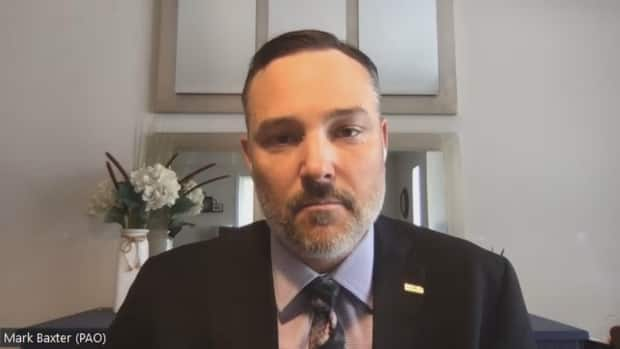LaSalle police trying something new to recruit amid nationwide staffing challenge

Once Dan Aheer completes the psychology honours program at the University of Windsor, applying to become a police officer crosses his mind as a way to better assist people with mental health issues.
There continues to be "big challenges" recruiting police officers across Canada right now, which contributes to a "staffing crisis," according to the Police Association of Ontario.
The LaSalle Police Service is exploring a new way to potentially attract recruits down the road, such as Aheer. He's 20 years old and "a bit on the fence" about becoming an officer.
"This is why I think my background in psychology will help a lot, because very often when you're in contact with a police officer, it isn't exactly the best day of your life. I think having that experience, understanding people, will help a lot," said Aheer.
This week he was one of four University of Windsor students who spent the day with officers of all ranks at LaSalle police. The partnership started late last year. It gives students from a range of academic backgrounds a chance to see what officers do and how they got there.
Aheer said he wants to learn more about the Community Outreach and Support Team (COAST). It's a partnership between LaSalle police and Hotel-Dieu Grace Healthcare that pairs an officer with a social worker. The team helps connect those experiencing mental health issues with the resources they need.
It also reduces the workload of front-line officers, who have been dealing with an increasing number of mental health-related calls.
To address this in Windsor, police chief Jason Bellaire has previously called for changes to the health-care system that "has so many gaps and disconnects between services."
The Windsor Police Service declined to be interviewed about its recruitment efforts.
'Re-branding' policing to attract new recruits
To encourage people to apply, several associations are working on a concerted effort to re-brand the policing profession, something that hasn't been done before.
It's a partnership between the Police Association of Ontario (PAO), the Ontario Provincial Police Association, the Toronto Police Association and the Ontario Association of Chiefs of Police.
Over the next several months, the group hopes to roll out a "positive PR campaign to get our youth, to get young adults interested in policing," said PAO president Mark Baxter.
The challenge to recruit new police officers has been "exacerbated" by a few factors, according to the PAO. Since September, five officers have been killed in the line of duty, highlighting the many risks of the job.
"Policing has become an increasingly complex job where members are asked to do more with less," said Baxter.

In recent years, there's also been more scrutiny of the profession and calls for reform after high-profile instances of police brutality.
Baxter says negative media attention, often stemming from incidents in the U.S., also may affect public interest in applying to become an officer, however, "it's still one of the most noble professions" for people looking to get into public service.
That's one area Sajed Farhat said he wants to change; the sometimes negative perception of policing. Even though policing may not be as desirable as it once was, Farhat said he's passionate about helping people and focused about becoming a sworn officer.
The 24-year-old University of Windsor criminology and psychology student also spent the day shadowing LaSalle police.
"They need more good police officers. We need more people to like the police, to be involved with the police," said Farhat.
Police organizations now selling themselves to recruits
A small police service like LaSalle, which serves a community of more than 32,000 people, competes for the same recruits as the organizations in larger cities. Each year, LaSalle hires one or two sworn officers.
"We want to sell ourselves. Everyone thinks the candidate has to sell themselves to us, but the tide has changed a bit," said Jason Woods, deputy chief with LaSalle police.
The selling points of a smaller service are also different as LaSalle police tends to be more community focused, said Senior Const. Bonnie Racine.

Most of her time is spent as a COAST officer helping those with mental health issues alongside a social worker. However, since it is a smaller police service, she rotates through more than a dozen other roles at different points throughout the year. Racine helps recruit, is trained as a crisis negotiator, on the marine unit and investigates sexual assaults as well as crimes against children, among other tasks.
Over the next five years, LaSalle police said seven of its officers will be eligible to retire, which is a lot for a service with 40 sworn members.
"It is a large concern," said Racine, adding that seven officers is a platoon or the equivalent of an entire shift.
Recruitment challenges lead to officer burnout
The challenge to recruit comes at a big cost; officer burnout. CBC News previously reported 35 per cent of officers who participated in a Canadian Police Association (CPA) survey said they went to work when mentally unwell. That, the CPA previously told CBC, affects overall community safety.
Every police department in Ontario is short staffed, which puts a strain on current officers, said Baxter.
A lack of interest in policing also causes problems filling retirements or other vacancies, adding to the stress of those still on the front lines, said Baxter. Officers often respond to traumatic calls, which can cause post-traumatic stress disorder.
"Oftentimes, not always, but often, they have to leave the workplace for a period of time so they can get the treatment they need and take care of their own mental health so they can then take care of the members in their community," said Baxter.


